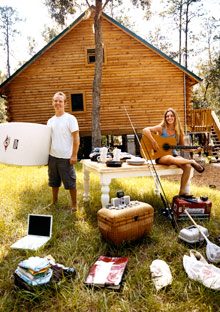Back to Basics: Living with "Voluntary Simplicity"

Photo: Rob Howard
PAGE 3
True, I am one of those Americans whose house is too big for their income. One of those poor schmucks who have to work long hours at jobs they wish they didn't have just to pay to heat rooms they don't need. Meanwhile, Kristen, who earns a small salary as an elder caretaker, has cash to spare. This keeps her high on the juice of freedom. So intoxicated, in fact, that she craves more. Hence our trip to learn more about the Simple Living Institute, a group she hopes will offer additional ideas for paring down her already austere life.
"I can do more," she says excitedly. By which she means, have less. Such is the heart of the simple living philosophy: Become conscious of what you genuinely need, and the rest, punt like a rotten apple.
"I do have friends who just don't get what I'm doing," she says with a shrug. "Many of my friends from my old life think I'm a little nuts. But my true friendships are getting much deeper. The other people who do this, we make time for each other. We care about community. We volunteer. We create time to do the things we believe in, in lieu of just mindlessly accumulating."
Instead of shopping, Kristen now gardens. Instead of buying new clothes, she trades with friends. Instead of racing to get her kids new bicycles from a big-box store, they prowl the thrift shops until the right one turns up.
"I also stopped dyeing my gray hair, which has mortified some of my girlfriends," she says, laughing. "I don't care. I don't want to spend time altering myself anymore. I want to be happy as I am, with who I am and what I have."
"Me too," I think. I'd like to feel cage-free, unburdened. Minus the gray hair—I draw the line at voluntary aging.
The notion of voluntary simplicity has been around for centuries; see: Buddha, Jesus, Thoreau, the Shakers, the Amish. In 1936 a Quaker named Richard Gregg published an essay titled "The Value of Voluntary Simplicity," thus coining the term. Over time the concept evolved into a movement, though it remained a fringe lifestyle. But 2008 was something of a perfect storm for the voluntary simplicity movement. The mortgage crisis, the banking meltdown, the spike in gas prices, and the unfettered baking of our atmosphere has led an unprecedented number of folks to put down the credit cards and start thinking about plan B. According to Wanda Urbanska, 52, the amiable host of PBS's Simple Living with Wanda Urbanska and the de facto Martha Stewart of the voluntary simplicity movement, the lifestyle is gaining mainstream appeal. At least 10 percent of the population, by some estimates, have embraced the tenets of living simply.
"This isn't a fringe thing anymore," Urbanska says from her home in Mount Airy, North Carolina, considered a simple-living hot spot. "There is a shift going on. When I first started talking about this in 1992, I was seen as a wacko zealot. Now simple living is fashionable."
"I can do more," she says excitedly. By which she means, have less. Such is the heart of the simple living philosophy: Become conscious of what you genuinely need, and the rest, punt like a rotten apple.
"I do have friends who just don't get what I'm doing," she says with a shrug. "Many of my friends from my old life think I'm a little nuts. But my true friendships are getting much deeper. The other people who do this, we make time for each other. We care about community. We volunteer. We create time to do the things we believe in, in lieu of just mindlessly accumulating."
Instead of shopping, Kristen now gardens. Instead of buying new clothes, she trades with friends. Instead of racing to get her kids new bicycles from a big-box store, they prowl the thrift shops until the right one turns up.
"I also stopped dyeing my gray hair, which has mortified some of my girlfriends," she says, laughing. "I don't care. I don't want to spend time altering myself anymore. I want to be happy as I am, with who I am and what I have."
"Me too," I think. I'd like to feel cage-free, unburdened. Minus the gray hair—I draw the line at voluntary aging.
The notion of voluntary simplicity has been around for centuries; see: Buddha, Jesus, Thoreau, the Shakers, the Amish. In 1936 a Quaker named Richard Gregg published an essay titled "The Value of Voluntary Simplicity," thus coining the term. Over time the concept evolved into a movement, though it remained a fringe lifestyle. But 2008 was something of a perfect storm for the voluntary simplicity movement. The mortgage crisis, the banking meltdown, the spike in gas prices, and the unfettered baking of our atmosphere has led an unprecedented number of folks to put down the credit cards and start thinking about plan B. According to Wanda Urbanska, 52, the amiable host of PBS's Simple Living with Wanda Urbanska and the de facto Martha Stewart of the voluntary simplicity movement, the lifestyle is gaining mainstream appeal. At least 10 percent of the population, by some estimates, have embraced the tenets of living simply.
"This isn't a fringe thing anymore," Urbanska says from her home in Mount Airy, North Carolina, considered a simple-living hot spot. "There is a shift going on. When I first started talking about this in 1992, I was seen as a wacko zealot. Now simple living is fashionable."



